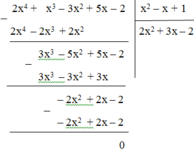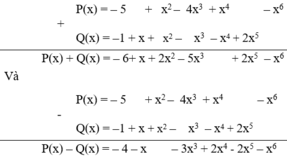Làm tính chia
a) (x4-x3-3x2+x+2):(x2-1)
Hãy nhập câu hỏi của bạn vào đây, nếu là tài khoản VIP, bạn sẽ được ưu tiên trả lời.


a: \(=\dfrac{\left(x^2+5\right)\left(x^2-5\right)+2x\left(x^2+5\right)}{x^2+5}=x^2+2x-5\)
b: \(=\dfrac{x^3-2x^2-x^2+2x+3x-6}{x-2}=x^2-x+3\)

a) Đa thức thương 4x – 11 và đa thức dư 26x – 10.
b) Đa thức thương 2 x 2 – 3x + 5 và đa thức dư 3x + 4.

Thực hiện phép chia:

Vậy (2x4 + x3 – 3x2 + 5x – 2) : (x2 – x + 1) = 2x2 + 3x - 2

\(a,=2x^3y+2x^2y^2-6xy^3\\ b,=3x^3+6x^2-4x-8\\ c,=\left(4x^2+16x-20x-80+76\right):\left(x+4\right)\\ =\left[\left(x+4\right)\left(4x-20\right)+76\right]:\left(x+4\right)\\ =4x-20\left(dư.76\right)\\ d,=\left(x^4-x^2-x^3+x-2x^2+2\right):\left(x^2-1\right)\\ =\left(x^2-1\right)\left(x^2-x-2\right):\left(x^2-1\right)\\ =x^2-x-2\)

Thu gọn, sắp xếp đa thức theo lũy thừa giảm của biến:
* Ta có: f(x) = x5 – 3x2 + x3 – x2 – 2x + 5
= x5 – (3x2 + x2 ) + x3 - 2x + 5
= x5 – 4x2 + x3 – 2x + 5
= x5 + x3 – 4x2 – 2x + 5
Và g(x) = x2 – 3x + 1 + x2 – x4 + x5
= (x2 + x2 ) – 3x + 1 – x4 + x5
= 2x2 – 3x + 1 – x4 + x5
= x5 – x4 + 2x2 – 3x + 1
* f(x) + g(x):


dựa vào đây nha bạn: https://hoc24.vn/hoi-dap/question/476806.html

\(\dfrac{1}{x+2}+\dfrac{5}{2x^2+3x-2}\\ =\dfrac{1}{x+2}+\dfrac{5}{\left(2x-1\right)\left(x+2\right)}\\ =\dfrac{2x-1}{\left(2x-1\right)\left(x+2\right)}+\dfrac{5}{\left(2x-1\right)\left(x+2\right)}\\ =\dfrac{2x-1+5}{\left(2x-1\right)\left(x+2\right)}\\ =\dfrac{2x+4}{\left(2x-1\right)\left(x+2\right)}\\ =\dfrac{2\left(x+2\right)}{\left(2x-1\right)\left(x+2\right)}\\ =\dfrac{2}{2x-1}\)
__
`x^3+1` chứ cậu nhỉ?
\(\dfrac{-3x^2}{x^3+1}+\dfrac{1}{x^2-x+1}+\dfrac{1}{x+1}\\ =\dfrac{-3x^2}{\left(x+1\right)\left(x^2-x+1\right)}+\dfrac{1}{x^2-x+1}+\dfrac{1}{x+1}\\ =\dfrac{-3x^2}{\left(x+1\right)\left(x^2-x+1\right)}+\dfrac{x+1}{\left(x+1\right)\left(x^2-x+1\right)}+\dfrac{x^2-x+1}{\left(x-1\right)\left(x^2-x+1\right)}\\ =\dfrac{-3x^2+x+1+x^2-x+1}{\left(x+1\right)\left(x^2-x+1\right)}\\ =\dfrac{-2x^2+2}{\left(x+1\right)\left(x^2-x+1\right)}\\ =\dfrac{-2\left(x^2-1\right)}{\left(x+1\right)\left(x^2-x+1\right)}\)
\(=\dfrac{-2\left(x-1\right)\left(x+1\right)}{\left(x+1\right)\left(x^2-x+1\right)}\\ =\dfrac{-2\left(x-1\right)}{x^2-x+1}\)
__
a) \(\dfrac{1}{x+2}+\dfrac{5}{2x^2+3x-2}\)
\(=\dfrac{1}{x+2}+\dfrac{5}{2x^2+4x-x-2}\)
\(=\dfrac{2x-1}{\left(2x-1\right)\left(x+2\right)}+\dfrac{5}{2x\left(x+2\right)-\left(x+2\right)}\)
\(=\dfrac{2x-1+5}{\left(2x-1\right)\left(x+2\right)}\)
\(=\dfrac{2x+4}{\left(2x-1\right)\left(x+2\right)}\)
\(=\dfrac{2\left(x+2\right)}{\left(2x-1\right)\left(x+2\right)}\)
\(=\dfrac{2}{2x-1}\)
\(---\)
b) \(\dfrac{-3x^2}{x^3+1}+\dfrac{1}{x^2-x+1}+\dfrac{1}{x+1}\) (sửa đề)
\(=\dfrac{-3x^2}{\left(x+1\right)\left(x^2-x+1\right)}+\dfrac{x+1}{\left(x+1\right)\left(x^2-x+1\right)}+\dfrac{x^2-x+1}{\left(x+1\right)\left(x^2-x+1\right)}\)
\(=\dfrac{-3x^2+x+1+x^2-x+1}{\left(x+1\right)\left(x^2-x+1\right)}\)
\(=\dfrac{-2x^2+2}{\left(x+1\right)\left(x^2-x+1\right)}\)
\(=\dfrac{-2\left(x^2-1\right)}{\left(x+1\right)\left(x^2-x+1\right)}\)
\(=\dfrac{-2\left(x-1\right)\left(x+1\right)}{\left(x+1\right)\left(x^2-x+1\right)}\)
\(=\dfrac{-2x+2}{x^2-x+1}\)
\(---\)
c) \(\dfrac{1}{1-x}+\dfrac{1}{1+x}+\dfrac{2}{1+x^2}+\dfrac{4}{1+x^4}\)
\(=\dfrac{1+x}{\left(1-x\right)\left(1+x\right)}+\dfrac{1-x}{\left(1-x\right)\left(1+x\right)}+\dfrac{2}{1+x^2}+\dfrac{4}{1+x^4}\)
\(=\dfrac{1+x+1-x}{1^2-x^2}+\dfrac{2}{1+x^2}+\dfrac{4}{1+x^4}\)
\(=\dfrac{2}{1-x^2}+\dfrac{2}{1+x^2}+\dfrac{4}{1+x^4}\)
\(=\dfrac{2\left(1+x^2\right)}{\left(1-x^2\right)\left(1+x^2\right)}+\dfrac{2\left(1-x^2\right)}{\left(1-x^2\right)\left(1+x^2\right)}+\dfrac{4}{1+x^4}\)
\(=\dfrac{2+2x^2+2-2x^2}{1-x^4}+\dfrac{4}{1+x^4}\)
\(=\dfrac{4}{1-x^4}+\dfrac{4}{1+x^4}\)
\(=\dfrac{4\left(1+x^4\right)}{\left(1-x^4\right)\left(1+x^4\right)}+\dfrac{4\left(1-x^4\right)}{\left(1-x^4\right)\left(1+x^4\right)}\)
\(=\dfrac{4+4x^4+4-4x^4}{1-x^8}\)
\(=\dfrac{8}{1-x^8}\)
#\(Toru\)

Ta đặt và thực hiện phép tính P(x) + Q(x) và P(x) – Q(x) có

Vậy: P(x) + Q(x) = – 6 + x + 2x2 – 5x3 + 2x5 – x6
P(x) – Q(x) = – 4 – x – 3x3 + 2x4 - 2x5 – x6

\(1,A⋮B\Leftrightarrow x^3-3x^2-ax+3=\left(x-1\right)\cdot a\left(x\right)\)
Thay \(x=1\)
\(\Leftrightarrow1-3-a+3=0\\ \Leftrightarrow a=1\)
\(2,A⋮B\Leftrightarrow3x^3-16x^2+25x+a=\left(x^2-4x+3\right)\cdot b\left(x\right)\\ \Leftrightarrow3x^3-16x^2+25x+a=\left(x-3\right)\left(x-1\right)\cdot b\left(x\right)\)
Thay \(x=1\)
\(\Leftrightarrow3-16+25+a=0\\ \Leftrightarrow a=-12\)
Thay \(x=3\)
\(\Leftrightarrow3\cdot27-16\cdot9+25\cdot3+a=0\\ \Leftrightarrow81-144+75+a=0\\ \Leftrightarrow12+a=0\Leftrightarrow a=-12\)
Vậy \(a=-12\)

\(f\left(x\right)-g\left(x\right)=\left(x^5-3x^2+x^3-x^2-2x+5\right)-\left(x^2-3x+1+x^2-x^4+x^5\right)\)
\(f\left(x\right)-g\left(x\right)=x^5-3x^2+x^3-x^2-2x+5-x^2+3x-1-x^2+x^4-x^5\)
\(f\left(x\right)-g\left(x\right)=\left(x^5-x^5\right)+\left(-3x^2-x^2-x^2-x^2\right)+x^3+\left(-2x+3x\right)+\left(5-1\right)+x^4\)
\(f\left(x\right)-g\left(x\right)=-6x^2+x^3+x+4+x^4\)
\(f\left(x\right)-g\left(x\right)=x^4+x^3-6x^2+x+4\)
Có : x^4-x^3-3x^2+x+2 = (x^4-x^2)-(x^3-x)-(2x^2-2)
= x^2.(x^2-1)-x.(x^2-1)-2.(x^2-1)
= (x^2-1).(x^2-x-2)
=> x^4-x^3-3x^2+x+2 : x^2-1 = x^2-x-2
k mk nha